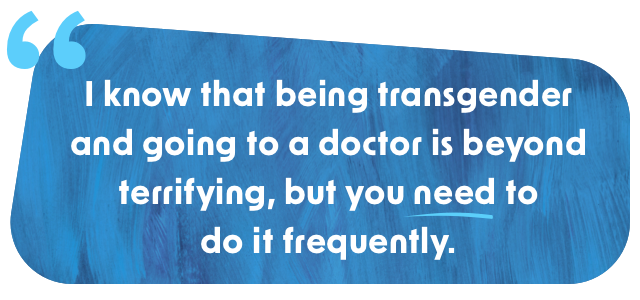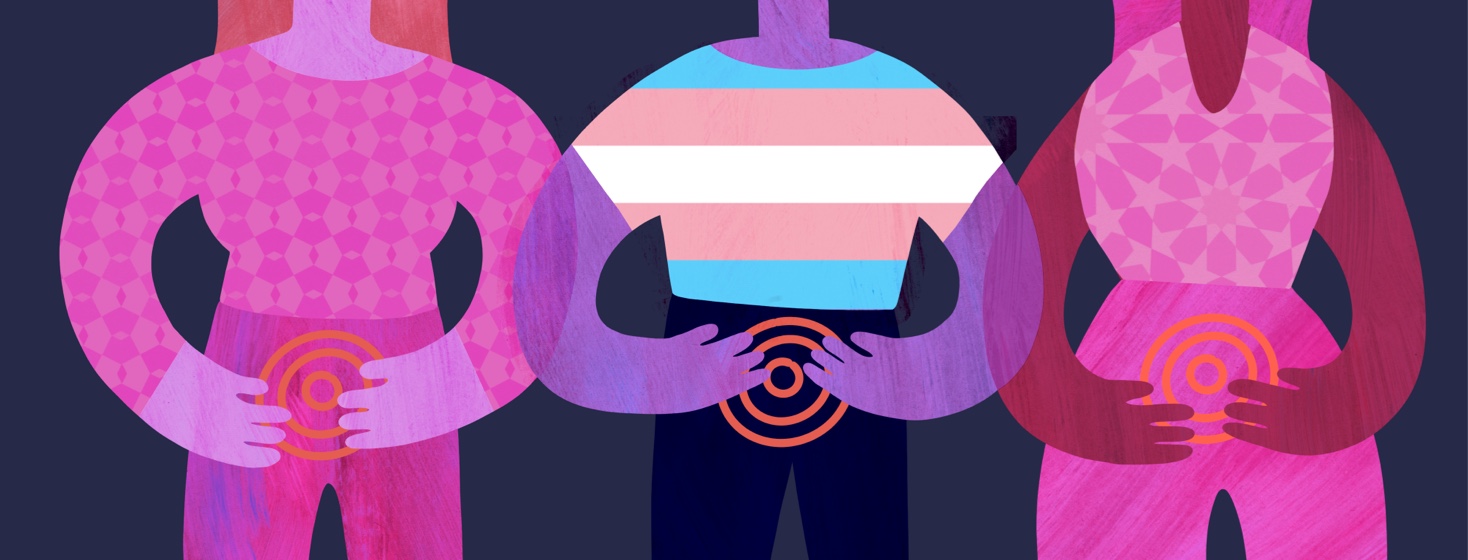Interview With Nolan: Yes, Trans People Can Get Ovarian Cancer
Ovarian cancer can affect anyone who has female reproductive organs. We often assume that all people with ovarian cancer are women, but this is not always the case. We interviewed Nolan, an ovarian cancer survivor who overcame the odds after having a 25-pound tumor removed, about his experience.
Getting diagnosed with ovarian cancer
Take us back to when you were initially diagnosed – you had talked before about subtle signs and changes you were noticing in your body. What were those initial signs? How did you react once ovarian cancer was confirmed? Was there anything that surprised you the most? What was your diagnosis?
My diagnosis of ovarian cancer was an interesting ride, especially given the fact that I am not your usual patient for this kind of cancer, being a transman.
In the months leading up to my trip to the emergency room, I really didn't notice anything out of the ordinary, mainly because I had just started my medical transition 6 months prior.
I had gained some weight in my belly area but assumed I was getting a "dad body" from taking testosterone. I'd get heartburn daily but, again, assumed it was due to taking testosterone. I couldn't eat, but yet my belly was constantly growing.
Arriving at the emergency room
I was out one night performing in a drag show while experiencing some of the worst pain in my side that I had ever had. I managed to get through the show, and upon getting home, my partner at the time ended up rushing me to the hospital.
Upon arriving at the emergency room, the doctors assumed I was pregnant with how large the mass was on my stomach, and I'll never forget the panic going through my mind when they asked me that.
After being admitted, the array of testing began. A 4-hour surgery later, they managed to remove the 25-pound tumor from my ovary in one piece, literally saving my life. The doctors were stunned that the entire mass stayed together and avoided breaking into my fallopian tubes.
Thankfully, due to it being all together, instead of their initial prediction of it being stage 3 or 4, I was lucky to be diagnosed with stage 1C ovarian cancer.
Advice to family and loved ones on navigating ovarian cancer
Cancer is an extremely taxing experience for not only the patient but often friends and family. What advice would you give to help patients and their support network prepare for this battle? What did you find that you needed most during the toughest times of your treatment cycle?
It's not like caring for someone with a cold or the flu. Do not go into this assuming it is just a fun little weekend of playing caretaker.
Chemo destroys you inside and out, and you have to be prepared to see the person you love and care about drastically change for a temporary part of their life.
Chemo sucks any bit of personality you have. During my treatments, I mentally shut down and felt like a complete burden on the people in my life. I couldn't get myself to reach out for help from anyone because I didn't want anyone else to have to deal with it and judge me for needing help. This was partially a trauma response to how my partner, during treatments, was treating me.
I felt alone and trapped in my apartment day in and day out, just waiting for my next round of treatments. Your friends and loved ones need you to reach out. In most cases, they won't have the mental capacity to do it, so taking that burden off of them and being there for them before they have to ask is life-saving, at least in my case.

Nolan's treatment for ovarian cancer
Speaking of treatment, you went through an initial surgery and then chemotherapy. How did each step of your treatment plan go? What does maintenance care look like for you at this point in time? Are you receiving regular check-ups?
Thankfully with how young I am, my body was able to handle the surgeries and rounds of chemo fairly well. I ended up having 2 surgeries before treatment: 1 to remove the tumor, then a second to have a full hysterectomy and get my chemo port.
Recovering from the tumor being removed was hands down the hardest part of recovery. I had an 8-inch incision in my stomach that didn't heal well, especially once chemo started, and gave me some complications healing.
The actual rounds of chemo were just like a brutal hangover you couldn't get rid of until round 4 completely knocked me out. Round 4 destroyed me. I passed out 3 times trying to go to the bathroom the nights following treatments.
When I went to my follow-up appointment the next day, I had to be wheel-chaired into the hospital, and my heart rate levels were so low I had to stay in the infusion center for an extra hour for monitoring and hydration treatments. I have never felt so weak in my life.
Currently, I am 3 and a half years in remission. I have hit the point in my follow-up appointments that I only have to check in every year. Still, honestly, I have been horrible at seeing my oncologist, partially because it's terrifying being a transman going into a gynecologist's office.
During treatments, while I was bald with no facial hair, it was a little easier because I was not seen as much as a man. But now that my hair has grown back, I have been passed between different doctors and get stares from other patients in the waiting room, so it makes the process a little unwelcoming.
Navigating healthcare
It's no secret that trans people are, unfortunately, and all too often, marginalized by many different systems in our society. What was your experience with the healthcare professionals that managed your diagnosis and treatment? What was the best thing they did for you? What is something you hope they learned from your case?
During my treatments, I had to educate pretty much all my doctors on what it means to be a transgender patient. Most doctors were pretty welcoming, but I encountered a few that made the process an absolute nightmare.
The biggest issue that transgender and nonbinary patients face in the medical world is simply being ignored. A doctor finds out someone is trans, and they would rather not treat them than do 5 seconds of research and treat this patient like a human.
Using a patient's preferred name and pronouns is the easiest step. If a doctor is unwilling to do that, they don't really care about the patient and shouldn't be in their position. Too many doctors focus on the details of their transition to the point that they ignore the key issues they are even there for, which can result in poor medical care.
During my treatments, I had to explain details to doctors that had nothing to do with why I was there, just because I was trans and they were "curious." Yes, there is some medical history required for treatments, but there are lines that get crossed far too often.
Hormone replacement therapy to blame?
Initially, there was the question of if my cancer was caused by my HRT (hormone replacement therapy) or, more specifically for me, injecting testosterone weekly. Upon diagnosis, my doctors took me off my testosterone for a month and a half immediately after my hysterectomy while they tested my tumor.
Basically, they were testing my tumor to see if it came up "estrogen-positive." If it did, that would mean my injections had actually been converted from testosterone to estrogen and caused a mass to develop.
The tests were 0 percent estrogen positive, so they had no proof that my HRT caused it. The science and research on how HRT affects people are so limited still that it's still hard to say what caused it.
Getting passed off from doctor to doctor
My main oncologist passed me off to another doctor once my treatments concluded, and I honestly feel it was partially because I started to look more masculine again. My doctor didn't feel comfortable continuing to treat me.
Nurses that nurture
At the actual infusion center, though, I am extremely thankful for my 2 main infusion nurses during treatment. They were easily the most accepting and understanding people. My legal name wasn't changed during treatments, so all my medical records had my dead name on them, and my infusion nurses knew not to say that name out loud ever.
They fully respected my name and pronouns and would ask me about my life outside of treatments, drag, everything! They made me feel like an actual human when I walked into the infusion center.
Better understanding, better care, better outcomes
Opportunities to learn from each other and the experiences of others are really important to promote a stronger future for all people who may encounter ovarian cancer. What advice would you give to other trans people who find themselves in situations similar to yours?
I know that being transgender and going to a doctor is beyond terrifying, but you need to do it frequently. If you are taking any form of HRT, monitor your levels constantly!
Unfortunately, research is so limited on the long-term effects of HRT, and we need to be a part of the movement to get research out there. Many hospitals have specific sections of doctors specializing in LGBTQ+ patients. Do some research on what is available in your area and find a primary care physician that you can truly open up to and talk to.
If you feel your doctor isn't listening, move on. It can be hard to find someone you feel comfortable with, but you need to be open and honest with them to have the care you truly deserve.
Between appointments, stay aware of how your body is changing and feeling. If something starts to feel off, reach out and get yourself in as soon as possible. A lot of the side effects of ovarian cancer specifically are extremely similar to the side effects of testosterone, so it can be hard to differentiate between them.

Join the conversation